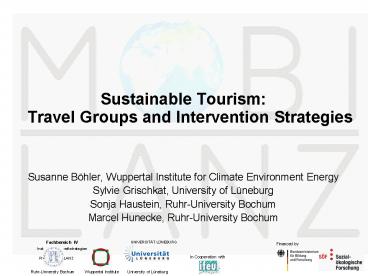Sustainable Tourism: Travel Groups and Intervention Strategies - PowerPoint PPT Presentation
1 / 22
Title:
Sustainable Tourism: Travel Groups and Intervention Strategies
Description:
80 % of European air travel is due to tourism. Aviation has shown the highest growth rate. ... Importance of air travel. No children. Ecological impact ... – PowerPoint PPT presentation
Number of Views:48
Avg rating:3.0/5.0
Title: Sustainable Tourism: Travel Groups and Intervention Strategies
1
- Sustainable TourismTravel Groups and
Intervention Strategies - Susanne Böhler, Wuppertal Institute for Climate
Environment Energy - Sylvie Grischkat, University of Lüneburg
- Sonja Haustein, Ruhr-University Bochum
- Marcel Hunecke, Ruhr-University Bochum
Financed by
In Cooperation with
Ruhr-University Bochum
Wuppertal Institute
University of Lüneburg
2
Facts and Trends of Tourism
- 80 of persons in Germany (gt14 years of age)
made at least one holiday trip in 2003. - An increase from 720 million tourists worldwide
in 2004 to 1600 million in 2020 is predicted. - Most trips are conducted by car.
- 80 of European air travel is due to tourism.
- Aviation has shown the highest growth rate.
- The majority of the greenhouse gases of domestic
tourism is emitted during travel to and from the
holiday destination (60 ).
3
Research Questions
- What is travel behaviour like?
- How is the environmental impact?
- Do individual characteristics explain travel
behaviour? - What are the strategies and obstacles to reduce
environmental impact of holiday mobility?
4
Research Questions
- What is travel behaviour like?
- How is the environmental impact?
- Do individual characteristics explain travel
behaviour? - What are the strategies and obstacles to reduce
environmental impact of holiday mobility?
5
Description of the MOBILANZ Sample (N1991)
Mobility purposes
6
Description of the MOBILANZ Sample (N1991)
Mobility purposes
7
Modal Split of Holiday and Short Stay Trips
(N1991)
8
Description of the Sample by Travel Groups
(N1984)
9
Travel Groups Number of holiday trips and
short-stay trips per year
10
Travel Groups Transportation Mode Choice
11
Travel Groups Description by Main Indicators
12
Research Questions
- What is travel behaviour like?
- How is the environmental impact?
- Do individual characteristics explain travel
behaviour? - What are the strategies and obstacles to reduce
environmental impact of holiday mobility?
13
Travel Groups Ecological Impact of Holiday Travel
14
Travel Groups Ecological Impact of Daily Mobility
CO2-equvivalent in kg per year and person
15
Research Questions
- What is travel behaviour like?
- How is the environmental impact?
- Do individual characteristics explain travel
behaviour? - What are the strategies and obstacles to reduce
environmental impact of holiday mobility?
16
Stepwise Regression to Predict Greenhouse Gas
Emissions
Note. R2 .17 adjusted R2 .17 p lt .01 p
lt .001
17
Summary
- There are significant differences between travel
groups. - Travel Groups behaviour differs concerning
number of holiday trips and transportation mode. - The smallest group (10.7) is responsible for
most emissions of greenhouse gases. - Socio-demographic variables are important factors
for holiday pattern. - Values like Openess für Chance have an effect
on number of trips and distances travelled. - A contradiction between ecological awareness and
holiday behaviour is identified within all travel
groups.
18
Research Questions
- What is travel behaviour like?
- How is the environmental impact?
- Do individual characteristics explain travel
behaviour? - What are the strategies and obstacles to reduce
environmental impact of holiday mobility?
19
Strategies for Sustainable Tourism Concerning
Travel behaviour
- Change of Holiday Destination Reduction of
Distances - Transportation Mode Shift to Long-distance Train
and Coach - Compensation Opportunities
- Economic Instruments
- Communication
20
Intervention Strategies for Travel Groups
21
Perspectives for Sustainable Tourism
- Limited possibilities to change holiday travel
behaviour and to reduce environmental impact
under current conditions. - Coaches and long-distance trains are options for
a more sustainable holiday travel, but - interviews proved especially less experience with
train travelling for holiday and a high extent of
refusal of train travelling due to choice of
destination, time money and complicity. - More knowledge about individual motivation of
choice of destination and the acceptance and
effects of intervention strategies are necessary. - Intervention strategies and the development of
services should consider different target groups.
22
Thank you for your attention! susanne.boehler_at_w
upperinst.org sylvie.grischkat_at_uni-lueneburg.de F
or further information check the Internet for
MOBILANZ http//eco.psy.ruhr-bochum.de/mobilanz































